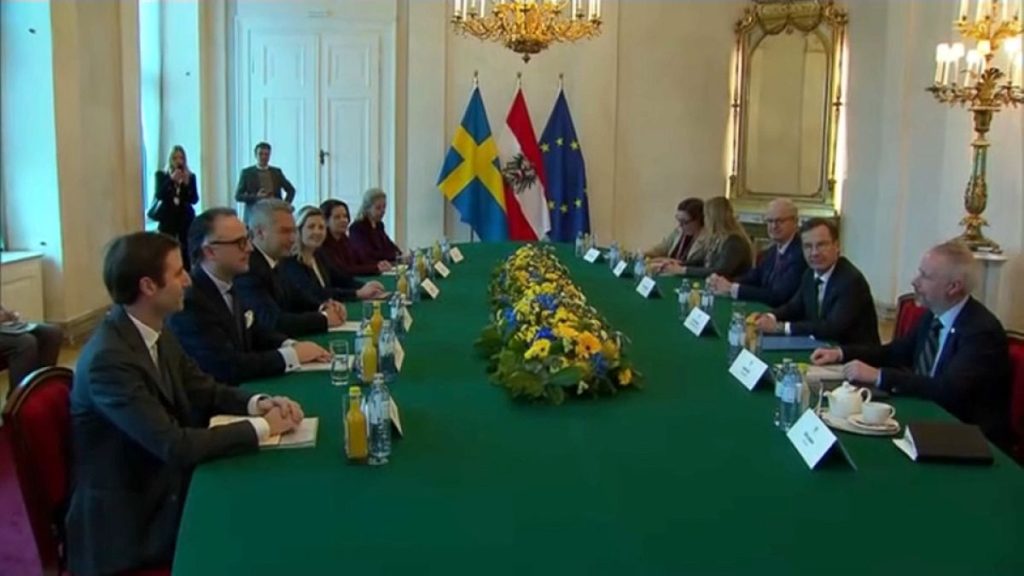Austrian Chancellor Karl Nehammer and Swedish Prime Minister Ulf Kristersson both emphasized the need for the European Union to address irregular migration at a meeting in Vienna celebrating 30 years of EU membership for their nations. They called for stronger border security and improved mechanisms to process and deport migrants whose asylum applications are rejected. Irregular migration has been a prominent issue within the EU, impacting election results and contributing to the rise of far-right parties across the bloc. Kristersson suggested the creation of “return hubs” to expedite the removal of irregular migrants, a proposal that had previously been discussed by EU leaders.
Sweden and Austria, both represented by conservative leaders, have aligned their positions on illegal migration, with Nehammer praising Kristersson for ensuring this issue remains a priority on the EU agenda. The meeting in Vienna marked the 30th anniversary of Austria, Sweden, and Finland joining the EU, extending the membership to 15 countries. These three nations were neutral during the Cold War and initially had not aligned themselves with the West. However, economic challenges in the 1980s led to their decision to join the EU in order to participate fully in the single market. Finland, Sweden, and Norway, which also sought to join but ultimately did not, faced significant challenges during the negotiation process, particularly in relation to agriculture, regional aid, budgetary matters, and fishing quotas. The accession agreements were ultimately approved through popular referendums, with varying levels of support in each nation.
The 30th anniversary meeting underscored the ongoing importance of cooperation and unity within the EU, particularly in the face of challenges such as irregular migration. Both Chancellor Nehammer and Prime Minister Kristersson emphasized the need for proactive, solutions-oriented approaches to address migration issues rather than simply discussing the complexities of the problem. Their shared commitment to tackling illegal migration reflects a broader trend within the EU of prioritizing border security and immigration controls in response to public concerns and political shifts within member states. By highlighting the cooperation between Sweden and Austria on these issues, the meeting sought to demonstrate the potential for solidarity and joint action within the EU framework.
The proposal for “return hubs” to streamline the process of deporting irregular migrants represents one potential strategy for addressing migration challenges. This approach would not only facilitate the removal of individuals whose asylum claims are rejected but also potentially serve as a deterrent for future irregular migration flows. By focusing on practical solutions and operational measures, EU leaders such as Kristersson and Nehammer are seeking to demonstrate progress and effectiveness in addressing the concerns of citizens regarding migration and border control. The emphasis on the establishment of return hubs reflects a broader shift towards more robust enforcement and management of migration issues within the EU framework.
The historical context of the accession of Sweden, Austria, and Finland to the EU provides insight into the evolution of the bloc and the challenges faced by member states in achieving their economic and political objectives. The decision to join the EU was driven by a desire to access the benefits of the single market and enhance economic opportunities for their citizens. The negotiation process highlighted the diverse interests and priorities of each nation, as well as the importance of securing public support through referendums. The complexities of the negotiations underscore the ongoing need for consensus-building and cooperation among member states, particularly on contentious issues such as migration that impact multiple countries within the EU.
Overall, the meeting in Vienna celebrating 30 years of EU membership for Austria and Sweden highlighted the importance of continued collaboration and coordination within the EU, particularly in addressing complex issues such as irregular migration. By emphasizing the need for practical solutions and proactive measures, Chancellor Nehammer and Prime Minister Kristersson exemplified a commitment to addressing challenges head-on rather than simply discussing them. The proposal for “return hubs” and the alignment of Sweden and Austria on migration issues signify a shared commitment to securing Europe’s borders and managing migration flows in a manner that balances concerns for security, humanitarian considerations, and respect for individual rights. Going forward, the EU will need to continue working together to address migration challenges in a comprehensive and sustainable manner that upholds its values and principles.


